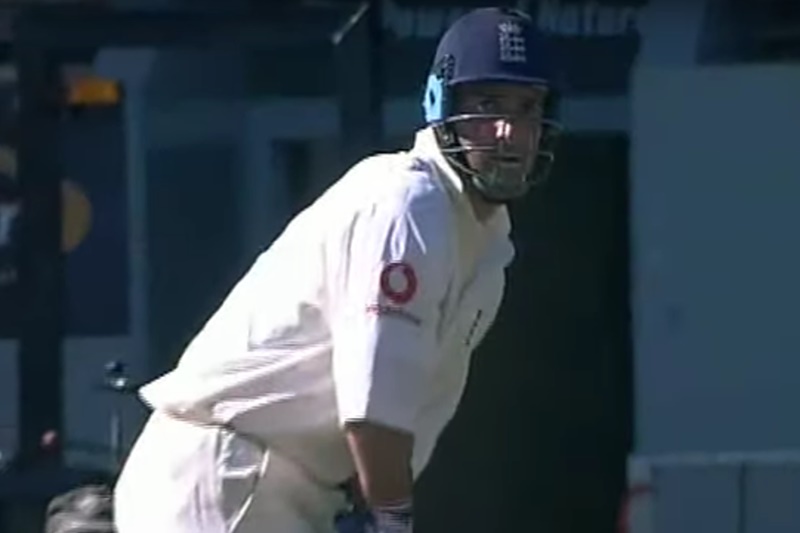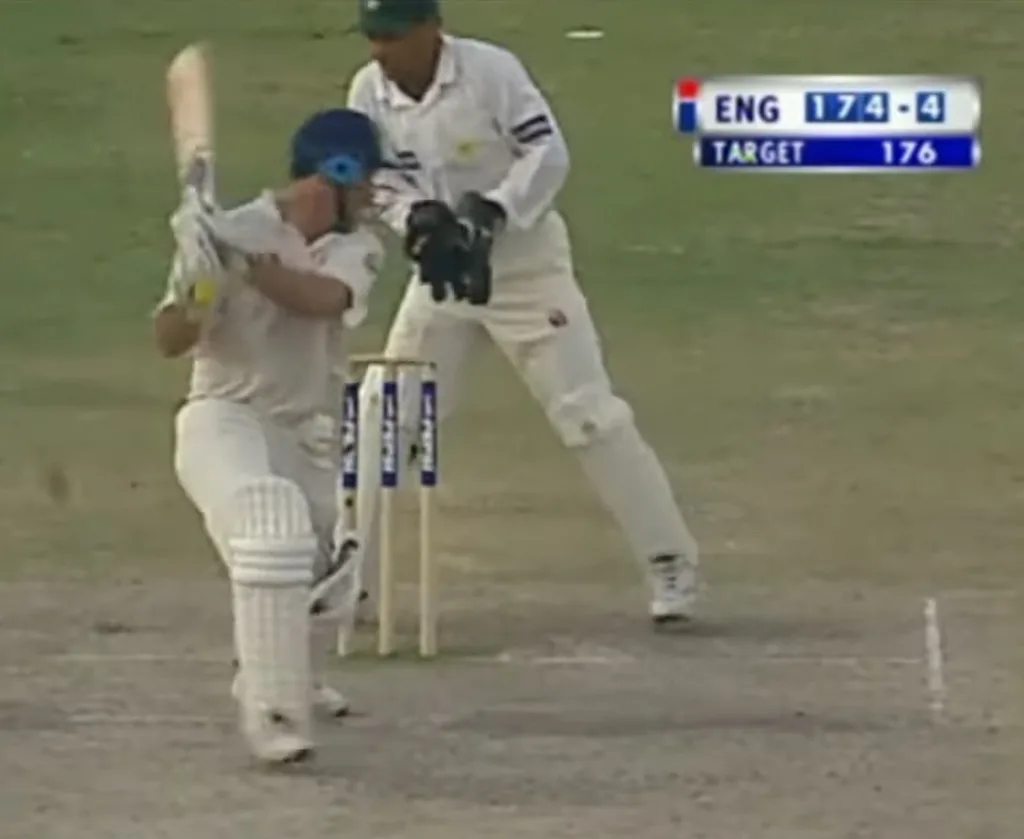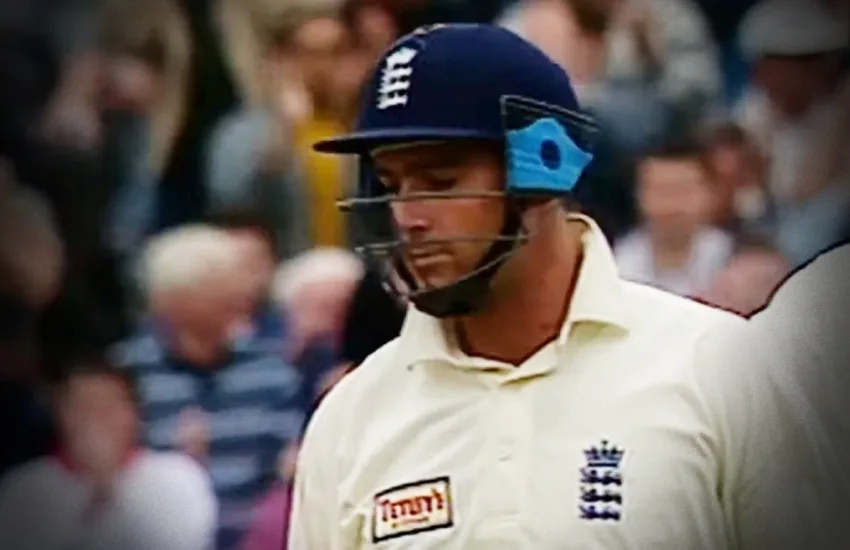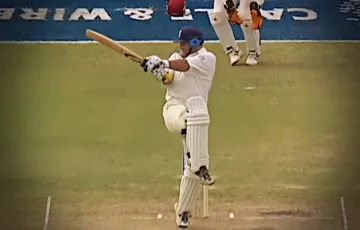A lot of England fans wouldn’t have stayed with Test cricket through the 90s if it hadn’t been for Graham Thorpe. He was a class above at a time when the team – and more importantly the supporters – needed it most. It is profoundly hollowing to hear that he has died at the age of 55.
England lost every single Ashes series from 1989 until that unforgettable triumph in 2005. Graham Thorpe’s career began in 1993 and ran until the very last Test before that 2005 series, against Bangladesh. He made 66 not out and never played again.
If that sounds like criticism by association, it is anything but. What we are highlighting here is the greater challenge of the period that almost exactly spanned Thorpe’s career.
The 1990s
Being an England Test cricket supporter in the 1990s required certain characteristics: defeatism, gallows humour and the ability to make the best of things – but you also needed hope. Without just a smidgen of hope, there is no point watching. Graham Thorpe provided actual legitimate cause for it.
England were 159-5 when he came to the crease in the second innings of his debut, against Australia. At that point they were only 107 ahead. He made 114 not out. A highly likely defeat became a possible victory and ultimately a draw. We don’t know if that sounds like much, but ultimately Throrpe’s efforts kept an awful lot of England fans emotionally invested in a game they’d otherwise have given up on much sooner.
Perform that trick again and again and the impact is considerable. In a grim era, Thorpe was the England batter who kept people interested. Who knows where that interest might have turned without him. Perhaps this website would not exist. The national side was not exactly awash with reliable performers. To give just a flavour of how things were, three other players made their debuts in that same Test: Mark Lathwell, Mark Ilott and Martin McCague.
That’s why Thorpe’s tally of half centuries versus hundreds (39 to 16) was not a measure of how often he ‘failed to convert’ but of how reliably he fulfilled his primary brief of giving the bowlers something to work with.

It is harder to bat well in a poor team, if only because there’s so much more to manage. At a time when scores were often low and England’s were generally lower still, Graham Thorpe averaged 44.66 across 100 Tests. Times have changed to the extent that it is hard to convey just how good that was.
If you look only at the period during which Thorpe was a Test cricketer, the England players who averaged more than him arrived late, during the era of central contracts when the national side belatedly began managing players half-decently. Marcus Trescothick averaged 45.47 in that time; Michael Vaughan averaged 45.02; and Andrew Strauss averaged 55.12. All three made their debuts in the 2000s.
Of those who played in the previous decade, Alec Stewart averaged 40.09; Mike Atherton averaged 38.55; Nasser Hussain averaged 37.76; and Robin Smith averaged 37.36. No-one else who played more than 20 Tests averaged over 35 in that time.
In terms of output and ability, Thorpe was such an outlier that we actually omitted him from our 1990s-est England XI a few years back. Put simply, he was just too good.
Passing the baton in the 2000s
We all know how calendars work, but people aren’t purely talking about time when they refer to England’s cricket in the 1990s. English cricket in the 90s is a whole thing in its own right that spills out beyond the decade itself. We’d actually argue that the 90s didn’t in fact end until that Ashes victory in 2005.
Because of what it was, the era wasn’t going to end of its own accord either. It needed to be actively ended and Thorpe was an absolutely central figure as it was gradually segued out of existence.
First there were the two, big, turnaround overseas victories in the winter of 2000/01. After years of defeat, Nasser Hussain was trying to fashion a team that could actually win and he wasn’t too sniffy about how they set about this.
Nothing exemplified this mentality better than Thorpe’s 118 off 301 balls in the first Test v Pakistan in Lahore. This was one of the most nurdlesome innings of all time, featuring just two fours.
It was also Thorpe who was there in the middle, in the dark, for the series-clinching victory in Karachi, having made 64 not out. He inside-edged the winning runs past his stumps, the ball by this point almost impossible to see.

After Christmas, the same side somehow won in Sri Lanka, despite a longstanding and entirely justified mortal fear of Muttiah Muralitharan.
Thorpe made 59 and 46 in the second Test in Kandy as England levelled the series. He then made 113 not out and 32 not out (out of 74-6) as they won the third and final Test in Colombo.
As England continued to set things in place for a better era, Thorpe remained, gluing it all together. He was there at the other end when Andrew Flintoff hit his first Test hundred, against New Zealand, in 2002. In marked contrast to that Lahore hundred, he was on his way to one of England’s most surprising double hundreds – 200 not out off 231 balls – after England had been 85-4. It wasn’t exactly his fault this didn’t prove the most memorable double hundred of the match.
Statistically speaking, his most successful year was 2004 when he made four hundreds and averaged 73.15. However it wasn’t long after that the slow pass of the baton climaxed with Kevin Pietersen’s selection ahead of him for the first Test of the 2005 Ashes.
It’s striking to us that Pietersen – one of England’s most visibly exceptional batters and a strong contender for an all-time England XI – averaged 47.28 in Test cricket while playing in far, far better sides than Thorpe. Different times, different roles, different men, but the colossal weight of Thorpe’s 44.66 shouldn’t be underestimated.
We were three-quarters of the way through writing this article and our central point was already in place when a friend messaged us out of the blue. He said: “I’m heartbroken about Graham Thorpe. If it wasn’t for him I would have jacked in watching cricket in 94.”




Devastated. Totally devastated.
Such a wonderful player, an artist with a bat in his hand, his particular canvas The Oval. There is no doubt that Cricket has lost part of its own soul today with the passing of Graham Thorpe.
I clearly remember an episode of “Question Of Sport”, Ian Botham and Bill Beaumont as captains. Chair (David Coleman maybe?), asked Graham Thorpe what the difference was between County and Test Cricket. His reply? “About £2,000.”
RIP.
In my memory Thorpe’s retirement was almost perfectly timed to allow England to shift to a new era of players with odd partly-bleached hair, aggression, and something called ‘winning against Australia’.
I don’t know the details of his far-too-soon departure from life’s crease, and if I’m honest I probably hadn’t given much active thought to his career in a long time, but there was a real deep sadness when I saw the news, one that everyone else I discussed it with seemed to share.
I think that Karachi innings is probably the first thing that comes to mind whenever his name is mentioned, for years afterwards whenever a cricket match was ‘going late’ (whether at professional level or at the end of our street against the bins) and the light was fading, the word ‘Karachi’ was never far from our lips.
This is all very true, and very well put. Fans are allowed to be pessimistic, but the in England team of the 90s it was the players and the team management that seemed to have the lowest expectations. I remember when a one-time hero of mine, Mike Atherton, admitted that he really didn’t care if England won or lost. On a human level I understood this, but at the same time it made Atherton just a bloke like me. Nothing to see here, nothing special, just another also-ran sportsman going through the motions.
Thorpe was not that. He was, as you say, a genuine source of hope. No matter that the Aussies (and everyone else) thought they could knock England over for a handful, they still found Thorpe a huge problem to deal with.
And then you factor in that for all his efforts, Thorpe well knew that at the end of the match it would be not be praise coming their way, only brickbats. To still have the strength to carry out the most mentally demanding of all sport activities is astonishing.
When he finally got a captain and a team worthy of him, it was unfortunately towards the end of his career. But he was the batter that the new England were built around. Hussein, Vaughan, Flintoff, Trescothick… these were all cut from newer cloth. Thorpe complemented that perfectly.
It is very sad and very shocking news.
To your point, I remember being so pleased that in the early-mid noughties Thorpe got a chance to be the best player in a *good* England team. It felt like such a drag being good in the 90s, but in the two stand out away performances (Asia in 00/01 and WI in early 2004, both of which still stand up as notable results) he was the adult in the room in both of them. He was good when England were crap, and really good as England got good. Even in SA in 04/05, he still seemed like a banker. And of course he should have played instead of Bell in 05.
Properly, properly good to watch too. In so many ways, a lot of similarities to how Root has been over the past 6 or 7 years (and there arent many compliments higher than that).
As we were writing this, we were aware we hadn’t mentioned how he batted – but the article was getting a bit long so we kept it out.
It’s a measure of his quality that he was all things. He could be cussed and score in singles when it was called for, but his general habit was to smear a barrage of early fours to let the opposition know what could happen and then play within himself. Also his pull shot was amazing.
That pull shot was unique – I cant quite think of a better way to describe it than it was a completely in control, authorative flap of a shot on one leg. With “strong bases”, you just dont see anything like that now.
Far more flamingo than the shot that normally attracts that name. (Not least because he sometimes played it airborne.)
Such sad news but thanks for the beautifully written tribute. I was fortunate enough to be in Colombo in 2001 to witness one of the great batting performances which, in my opinion was even better than the more talked about one that preceded it in Karachi.
Agreed. 145 unbeaten runs across two innings and the next best England effort after his 114* in either innings was Vaughan’s 26.
Mahela Jayawardene was the only other bloke to pass 50 in the match. Given that he made 11 Test hundreds at that ground and averaged 74.89, not a bad bloke to knock into second place.
A fantastic player and a big loss to English cricket. RIP.
Truly shocked to hear of this. Difficult to think any better player square of the wicket than him.
Never seemed to have much luck indeed his greatest misfortune was to come though in the 90s, having to deal with absolute batshit decisions like being dropped for Craig White. A typical Illibgwopeth call that as usual managed to weaken both batting and the bowling simultaneously
Was genuinely stunned to wake to this news. A quality player (probably England’s best of his era) and great to watch too; ironically his retirement was effectively to make way for a certain other era-defining personality.
He also featured in a star-studded Surrey XI that Somerset turned over in my first ever live cricket match. He made a graceful and entertaining 50 that day too.
Graham Thorpe.
As someone who watched the travails of the England team through the “long nineties”, I feel like I – we – all owe rather more to this man than he ever got out of the game. Every quality player from that generation was unlucky with their (or their parents’) timing, at least in terms of a life-changing pot of gold – a decade later there’d have been more Sky TV money on the table for national contracts and the chance to cash in on the nascent IPL.
My strongest memory of Thorpe was him dedicating that remarkable double ton in NZ to his two (as they numbered then) children, shortly after his divorce had made headlines. There was emotion on his face and in his voice that was very raw and I found deeply moving. In retrospect it was also impressive that a man so clearly in turmoil had achieved such a feat, requiring sustained concentration, application, and dominance over his opponents. And impressive in a different way, one I was more aware of at the time, that this high score, and the exceptional batsmanship that produced it, arguably did not mark the pinnacle of his career. You might not even rank it in his top three innings.
https://www.standard.co.uk/sport/thorpe-dedicates-double-ton-to-his-kids-6312063.html
But that little glimpse of the character behind the craft also makes me wonder whether cosmic timing let him down in other ways. Players around him have remarked how his on-field performance was intimately related to how he felt emotionally. How different might things have turned out for Thorpe, not just in terms of his cricketing results but his own wellbeing, if the culture that surrounded him had had more modern sensibilities about mental health, and a greater understanding of the grinding effect of interminable touring on people’s personal lives? (I was going to write “players'” but really this applies equally to support staff, and even some commentators have opened up about the stresses their global work schedule creates.)
The march of technology was frustratingly mistimed too. Thorpe’s generation of England players were among the last tourists to experience life without smartphones, hotel WiFi, free voice and even video calls to loved ones. It was a bigger world back then, and in terms of basic human connection those overseas series were very far from home, little changed from those undertaken decades earlier. An obituary notes that when his first wife was hospitalised with an ectopic pregnancy, it took two days for him to be able to be able to get back to her. These days I’m sure he’d have been rushed onto the next flight back.
Obviously technology has a darker edge as well. For all that Thorpe struggled with press intrusion into his very active personal life, social media has eaten even further into privacy. And doubtless for each beauty that the rumour mill dredged up, there’d be an Instagram or TikTok account for the ghouls to dissect. It’s one of life’s unanswerables whether different choices would have been made, a different life path navigated, in such a radically different social and technological landscape. But at the very least, it would have meant months spent working abroad would not have involved such personal isolation and lack of contact with the people who meant the most. To Thorpe this was clearly something that mattered dearly, and he missed out by a matter of years on a revolution we now all take for granted.
Another cultural change, again too late, has been a sharper disapproval of the rough-and-tumble of dressing-room “banter” and associated behaviour. The gossip I got from someone in the Surrey set-up during the latter half of Thorpe’s career was that both his Surrey and England colleagues referred to him as “Shagger” – rubbing a man’s nose into the failure of his marriage is hardly the sign of a healthy, supportive, high-performance culture.
Thorpe publicly complained about the toxicity of this environment, back when the “masculine” thing to do would have been to embrace it – or at least accept it like a “good sport”. It’s fair to assume we didn’t see England coax the best out of Thorpe, remarkable as his performances were amid a sea of mediocrity, and I imagine the same applies to several other players of that generation who found themselves on the wrong side of the dressing room. But that failure of the leadership team to address a corrosive culture was even more culpable for the toll it must have taken on their own players’ wellbeing and mental health, than for its self-defeating impact on the field of play.
Despite being at so many degrees of remove, as a “fan” – or in commercial terms, a “content consumer” – of cricket, I feel a sense of unease, a small personal slice of a collective guilt. Men and women get put through a lot for the sake of our own entertainment – or more specifically, for the sake of the dollars our engagement generates. We sent a man to the other side of the Earth, to perform an inherently dangerous physical activity, under intense media scrutiny, barely able to communicate with his young family for months – and what for? Some newspaper column inches to read, a highlights reel to watch, and stadium tickets for the lucky few?
As followers of cricket we owe something to those who enter the arena for us – at least to use our collective voice, or commercial pressure, to pressure the authorities into better looking after their welfare. I’m glad so much has changed since Thorpe’s era, but things are still a long way from perfect. It’s one reason I appreciate Yer Maj’s oft-repeated call not to admonish franchise-hopping players for commercialism. Whatever disappointment we feel at the way tradional forms of cricket are being undermined, every pro has a short career window to make money, and significant financial uncertainty thereafter.
Fortunately Thorpe was quick to find his feet professionally once his playing career was over. Through his coaching work he would have at least benefited somewhat from the influx of money into the game that his playing career just missed out on. And every interview I read from this phase of life suggested he found real happiness, stability, and support with his second wife and new family. I sincerely hope this was indeed the case, and only wish it had not ended so prematurely.
Well worth a read that comment. Think the impact of the internet age is a particularly big point. You put it nicely that those tours were really little different from those undertaken decades earlier. The sheer night and day contrast in communication is hard to appreciate now, even if you experienced it yourself, and must be impossible for younger generations to get a sense of.
And it was only a matter of years between international telephony becoming substantially more affordable, and the dawn of free worldwide video calls. Hard to overstate the effect on human relationships of everything from Skype to Facebook to (dare I say it, given the subject under discussion) Tinder. Thorpe met his first wife, an air hostess, in Dubai while he was on a Surrey pre-season tour and she was there on holiday – apparently he tripped over her foot at a party, they swapped (what would have been UK landline!) phone numbers, and weeks later she called him. It reads like Evelyn Waugh describing a chance encounter in the Middle East. Although a far smaller proportion of couples meet by serendipity at parties these days, I’m sure some still do start by tripping over each other. But their stories would simply never continue like something out of the 1920s.
On the player welfare front, it’s good that national boards have started to get more to grips with mental health and dressing-room culture, injury risk and recovery times, player workloads, family time and touring fatigue… but part of their ability (and indeed incentive) to handle those things comes from the long-term, year-round nature of their contracts. Exceptionally good players are a rare resource for national boards, and not something that can be traded in or out, so generally benefit from extra prioritisation. Thorpe would certainly have been managed more supportively, and hopefully found a less toxic team environment, in the current England set-up than back in his day. As we move into a globalised world of peripatetic franchise-hoppers, whose bosses have only short-term contracts at stake and to whom players are little more than fungible resources of skill-sets, there’s clearly a risk of progress being lost.
Extremely sad news. Excellent KC piece and heartfelt comments from other readers have pretty much said it all before I got here.
His post-playing career has not been discussed much. By all accounts Graham Thorpe’s talent for top-level coaching was, like his batting, truly world class. He has been much missed in the England set up since the untimely, tragic collapse of his health in 2022.
This interview puts a bit more focus on his coaching career:
https://www.espncricinfo.com/story/graham-thorpe-i-evolved-as-a-bloke-through-my-career-922747
It also notes that Thorpe was the first English player to tour for 10 consecutive winters, which says a lot both about him and, maybe more sadly, the impact of the game on his life.
Just to add my ‘wot they said’ to this. Great post and comments. Felt he was a bit underrated as an England batting hero, glad that many others in fact rated him. The rock amid the crumbling sandcastles of England’s 90s batting… Very sad and will be hard for his families.
Think he might fall into that category of having been so obviously superior to his colleagues, it’s almost not worth talking about. We should probably try to address that.
Thanks for this great write up. While the news is incredibly sad it is a moment to reflect on an amazing career. As a boy growing up watching England cricket from the late 80s, my heroes were Robin Smith and Graeme Thorpe. Both were bastions of hope in what were tough times. While Smith proved to have his flaws against spin, Thorpe was a total batsmen. Other batsmen of the area often come to people’s minds quicker (maybe due to their ongoing media careers), but Thorpe was in my view undoubtedly the best England batter of his generation. The article quotes averages over comparable periods for a few players, but I think at the end of the careers of those mentioned in this article only Pietersen had a higher test average. Thorpe is only just outside the Top 10 of England batsman test averages for post war careers, and when that is then considered in the context of the teams and environments he played in, I think it is exceptional. I believe that if he had played in the more supportive era that followed Thorpe could easily have been one of those rare players to end their career with an average over 50 (as his average of 54 in the final two years of his career highlights). Maybe he was not as flamboyant as a Pietersen, or elegant as a Gower, but his grit and determination carried the England batting order nearly single handed at times. And he was no snail paced accumulator – when Thorpe came in there was always the expectation of a (normally counter punching) flurry of boundaries which would spread the field before he then knocked it into the gaps.
The article hints at this thought, but for me if I was selecting an all time England 11 he might not make the final team, but he would be above Pietersen in my pecking order. More simply, if I was picking an England test team from my cricket watching life (from 1987) the first two batsmen on my team sheet would be Thorpe and Root.
At the same time, a large part of what made him the best batter of his generation was how he dealt with the situations he found himself in. We tried to convey in the article how this, for us, carries significantly more value than a few more runs on his average.
I agree 100%, but some of the comments have prompted me to look at that average. Of people that have made their debut since 1990 and scored 1k runs, only Root, KP, Cook and Brook have a better average than Thorpe. Brook probably has some “regressing to the mean” to go through (either that or we have a fun decade ahead). The other three of those would be in the conversation for best ever XI, and it is hard to argue that they didnt bat in a considerably preferable era both in terms of bowling attacks, quality around them and batting surfaces.
In fact, expand that out to 1970 and only Boycott and Amiss are added above him. I think we can get skewed by the number of players from other countries that average 50, but there’s actually only 21 English players in the last 55 years that have scored more than 1,000 runs at more than 40 (with only Root (just) and Brook over 50).
I completely agree with this – just highlighting this his end statistics were also a lot better than I think first impression might be. And as you say, in an incredibly challenging time to be an England batter.
Was a bit too upset to post earlier but just wanted to add my appreciation to the post, the comments but mostly, of course, to Graham Thorpe.
Mortality is a complete motherfucker.